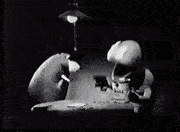|
If Indexer and Robot are part of the same design and you can add a copy constructor to Indexer, then add it. If not, define a wrapper for Indexer that does shared reference counting the way shared_ptr does. Or if you're in a hurry and these classes are not for third-party use, just use shared_ptr.KNITS MY FEEDS posted:e: Making the constructor accept Indexer *index_service and made the member variable Indexer* index_service seems to have worked but I'm not sure how right that was. Gazpacho fucked around with this message at 05:26 on Sep 3, 2012 |
|
|
|

|
| # ? Jun 7, 2024 23:33 |
|
Gazpacho posted:If Indexer and Robot are part of the same design and you can add a copy constructor to Indexer, then add it. If not, define a wrapper for Indexer that does shared reference counting the way shared_ptr does. Or if you're in a hurry and these classes are not for third-party use, just use shared_ptr. Thanks for the answer. Indexer should theoretically only be destroyed after all the Robots have called their destructors, they may call their destructors at different times. If I called delete index_service in Robot's desructor, would that delete the Indexer all the other instances of Robot are using? I don't want any memory leaks but I still want Indexer to run on the other instances of Robot.
|
|
|
|
KNITS MY FEEDS posted:If I called delete index_service in Robot's desructor, would that delete the Indexer all the other instances of Robot are using?
|
|
|
|
Gazpacho posted:As the code currently stands (using a real pointer), yes it would and that would be bad. Does auto_ptr free up that memory after the program finally completes or is this going to leak? (Robots run in threads if that matters)
|
|
|
|
auto_ptr deletes its object when the auto_ptr's destructor runs, according to the same destruction rules as any other instance. As you've written it, the Robots and then the Indexer will be automatically destroyed at the end of the block that created them.
|
|
|
|
KNITS MY FEEDS posted:Does auto_ptr free up that memory after the program finally completes or is this going to leak? Most operating systems automatically free all of a program's memory when it completes (the exceptions are some embedded systems, I believe - this isn't my area of expertise). A memory "leak" is when a program permanently loses access to memory, not the whole system.
|
|
|
|
And note that thread termination isn't sufficient, the malloc arena is global to the process.
|
|
|
|
Does anyone *cough* rjmccall *cough* know what it could mean when I'm working with Clang and get: my_cpp_filename_here-490634.s|6162|Error: missing or invalid immediate expression `72057594037927944' I wish I could come up with a simple, reduced test-case, but it's a huge metaprogram. Edit: I think I'm hitting some kind of compiler limit -- I'm working on a tensor library and when testing any tensors with a rank below 6, all my tests compile and work fine. Tensors of rank 6 and 7 cause the compiler to stop responding, and tensors of any rank greater than 7 cause an error like the one mentioned above. I was originally testing up to rank 15 in Clang and everything worked fine, but after some backend changes I've encountered the bugs. That Turkey Story fucked around with this message at 02:24 on Sep 7, 2012 |
|
|
|
Presumably an overflow error when either generating or passing the intermediate assembler. Get Clang to only generate the assembler and see if that barfs or at least try and find the broken line. This may be helpful: http://stackoverflow.com/questions/10990018/how-to-generate-assembly-code-with-clang-in-intel-syntax
|
|
|
|
That's an error from gas, not clang/llvm.
|
|
|
|
I'm working on a project that I want to be Unicode friendly, so I'm trying to follow the guidelines laid out here (basically, use UTF-8 everywhere you can, all char[]s/strings should be UTF-8, convert to something else immediately before/after you absolutely have to), but for some reason my conversion functions aren't working. At least I think that's the problem. Conversion functions: C++ code:C++ code: Edit: Apparently you have to set the flags parameter to 0 if you're using CP_UTF8, which fixes the first test, sort of, but the second one still gives me gibberish. The tests look like this as I step through the code: Test 1 Start: "UNICODE, <russian>" After narrow: "UNICODE, <random japanese characters>" (I assume that's just because Visual Studio doesn't like displaying UTF-8 and my language for non-unicode programs is set to japanese?) After widen: "UNICODE, <russian>" Test 2 Start: "UNICODE, <russian>" After widen: "UNICODE, <mostly diamond question mark symbols with a few english characters>" After narrow: "UNICODE, <random japanese characters>" ZombieApostate fucked around with this message at 06:05 on Sep 7, 2012 |
|
|
|
ZombieApostate posted:I'm working on a project that I want to be Unicode friendly, so I'm trying to follow the guidelines laid out here (basically, use UTF-8 everywhere you can, all char[]s/strings should be UTF-8, convert to something else immediately before/after you absolutely have to), but for some reason my conversion functions aren't working. At least I think that's the problem. You could try to use UTF8-CPP to make your life a little simpler..
|
|
|
|
I think the only case that isn't working now is if I try to start from a normal string literal that is using non-ASCII characters. I assume that gets encoded as whatever the current code page on your system is? It didn't seem to make a difference if I told it to save that file as UTF-8. I doubt there's a reliable way to go from that to a UTF-8 encoded string since I can't control what code page someone else is using and if it doesn't match whatever the string is encoded as, it won't convert properly. And it probably doesn't matter since I'm not going to hard code string literals outside of testing and all my input files will be UTF-8 anyways.
|
|
|
|
That Turkey Story posted:Does anyone *cough* rjmccall *cough* know what it could mean when I'm working with Clang and get: As someone else mentioned, that's not a clang/llvm diagnostic. That doesn't mean it isn't clang/llvm bug — we're either trying to emit an invalid operand, or we're actually internally corrupted and spitting out garbage. The latter would probably trigger an assert if you tried it with an +Asserts build of clang.
|
|
|
|
Aliasing rules are bothering me. Long story short, I need a version of memcpy that is guaranteed to copy aligned pointers atomically (on any platform I care about, that means loading and storing as a pointer-sized value), but the data can contain anything. I'm pretty sure the stock memcpy will do this in most scenarios, but I can't be 100% sure it won't optimize to rep stos or something like that. At the same time, I'm trying to stay strict aliasing clean and it looks like that can only be accomplished if I was copying char-sized data, or was using a union, but a union will only guarantee aliasing of types contained in the union. Is there a way to do this? Would declaring the destination volatile enforce that potentially-aliased values are reloaded after? OneEightHundred fucked around with this message at 21:12 on Sep 7, 2012 |
|
|
|
OneEightHundred posted:Aliasing rules are bothering me. Long story short, I need a version of memcpy that is guaranteed to copy aligned pointers atomically (on any platform I care about, that means loading and storing as a pointer-sized value), but the data can contain anything. I'm pretty sure the stock memcpy will do this in most scenarios, but I can't be 100% sure it won't optimize to rep stos or something like that. What's wrong with casting your pointers to char pointers, which can alias anything?
|
|
|
|
floWenoL posted:What's wrong with casting your pointers to char pointers, which can alias anything?
|
|
|
|
Then cast them back to pointers to word sized values.
|
|
|
|
pseudorandom name posted:Then cast them back to pointers to word sized values. That's not how aliasing works. OneEightHundred: if you can use compiler-specific stuff, GCC has an attribute may_alias which grants char-like powers to an arbitrary type. Alternatively, if you put your memcpy in a file by itself, I promise you will not have optimization problems, even if that one function technically violates aliasing rules.
|
|
|
|
edit: wrong button
|
|
|
|
rjmccall posted:Alternatively, if you put your memcpy in a file by itself, I promise you will not have optimization problems, even if that one function technically violates aliasing rules.
|
|
|
|
OneEightHundred posted:Does that still work even with whole program optimization? No, if you have some sort of whole-program optimization enabled, and you can't exclude that file, it's going to be a problem. Usually there's some way to mark the function as not being inlinable, or if all else fails you can write it in assembly. What compiler are you using?
|
|
|
|
Visual Studio, but there'll invariably be a GCC port at some point. e: Apparently VS took out the aliasing optimizations in 2005 and replaced them with a function-level keyword. OneEightHundred fucked around with this message at 22:42 on Sep 7, 2012 |
|
|
|
Yeah, MSVC is now very conservative about alias analysis; I guess they got burned by being too aggressive. GCC's TBAA is way too aggressive, really, and it basically miscompiles so much obvious code that people just turn the option off. Clang has a strategy which would let us use TBAA but hopefully not miscompile the obvious cases that GCC miscompiles; unfortunately, we haven't had enough time to do the validation that would make us feel confident about enabling it by default.
rjmccall fucked around with this message at 22:53 on Sep 7, 2012 |
|
|
|
OneEightHundred posted:The problem is that if they're copied as chars, then the pointer-sized value copies may not be atomic, which is necessary in this case. I'm pretty sure recasting the pointers won't fix that since aliasing affects value load/stores, not pointer conversion. Wait, so you're relying on the value type for atomic copying? i.e., are you saying you think that if you treat the array as a word array instead of a char array, it'll be atomic? That seems dangerous. I don't think there's any guarantee as to atomicity of value copies based on type. You may have to use atomic instructions. If so, then you can just use char *.
|
|
|
|
It's definitely not guaranteed (well, except in Java), but in practice, loads and stores of small, aligned, scalar, non-bitfield objects will always be emitted in a way that does not admit the possibility of partial writes. If that's all you need, you can skate by pretty effectively without a formal guarantee.
|
|
|
|
It's actually quite similar to the use of volatile objects to do memory-mapped I/O, which relies for correctness on the same not-technically-guaranteed assumptions about which instructions are going to be used to perform the operation. Deep systems programmers seem very comfortable relying on this kind of thing. Well, right up until they run into something they didn't expect, at which point they start insisting that they know the language better than you.
|
|
|
|
floWenoL posted:You may have to use atomic instructions. If so, then you can just use char *. Also I don't need them to be atomic in the sense of surviving load/store reordering, I just need them to be atomic in the sense that partially-written memory addresses will never be visible to another thread. In practice, every platform I can imagine caring about will guarantee write atomicity of pointer-sized values to aligned addresses, which is all I want. I just want to be able to do it without the compiler deciding that values it reads from the destination area haven't changed.
|
|
|
|
OneEightHundred posted:Like I said, char is out because char will emit as multiple single-byte copies, due to the possibility of the memory regions overlapping. I have to confess to not following the topic, but memcpy does not tolerate overlapping arguments. Maybe that tainted some previous test?
|
|
|
|
covener posted:I have to confess to not following the topic, but memcpy does not tolerate overlapping arguments. Maybe that tainted some previous test? memcpy does this on Windows at least and glibc probably does it too, but it's not guaranteed and intrinsics may cause other behavior (like emitting rep stos). Implementing it using chars, i.e. code:Copying it as an array of pointers will work, but the problem is that compilers are allowed to assume that, say, a float value read from the same destination region was not changed from the operation. OneEightHundred fucked around with this message at 16:54 on Sep 8, 2012 |
|
|
|
OneEightHundred posted:Implementing it using chars, i.e. Would using the 'restrict' keyword on the pointer parameters achieve your desired behavior since the compiler will know that your memory regions don't overlap?
|
|
|
|
I'm looking to write a small program that crawls through a directory tree looking for files of a certain type and copies matching files to a new directory (and creates the directory if it doesn't already exist). While I have an intermediate level of C++ experience, I've never had to do any real file manipulation and don't know where to start. Are there any good libraries for interrogating the contents of folders / getting file information / checking file extensions / copying files / creating new folders?
|
|
|
Citizen Erased posted:I'm looking to write a small program that crawls through a directory tree looking for files of a certain type and copies matching files to a new directory (and creates the directory if it doesn't already exist). Do you intend to make it cross-platform, i.e. the same code compile and run on both Windows and Unix-like systems? If not, then by all means use the APIs for file manipulation given by your OS.
|
|
|
|
|
Windows only most likely - it'd be nice to have cross platform support but if it is significantly more work then it isn't necessary. What would be the best source for the Windows calls? MSDN?
|
|
|
|
Citizen Erased posted:While I have an intermediate level of C++ experience, I've never had to do any real file manipulation and don't know where to start. Are there any good libraries for interrogating the contents of folders / getting file information / checking file extensions / copying files / creating new folders? Boost.Filesystem.
|
|
|
|
Awesome, that looks about the same in terms of implementation as the native windows APIs so I'll give it a shot - thanks!
|
|
|
|
Trying to optimize this factoring program and am getting absolutely nowhere, so I've come for help  . .What this program is supposed to do is find all prime factors of any number you input, and for extra credit it must work with 64 bit integers. I currently am using the following : code:Papes fucked around with this message at 03:43 on Sep 10, 2012 |
|
|
|
Papes posted:Trying to optimize this factoring program and am getting absolutely nowhere, so I've come for help Instead of checking all of the numbers from 2 to n/2 you only need to check the primes from 2 to floor(sqrt(n)).
|
|
|
|
Nippashish posted:Instead of checking all of the numbers from 2 to n/2 you only need to check the primes from 2 to floor(sqrt(n)). Thanks so much dude, that cut runtime down by nearly half. Seriously awesome man, being a newbie can be so overwhelming at times. 
|
|
|
|

|
| # ? Jun 7, 2024 23:33 |
|
Papes posted:Thanks so much dude, that cut runtime down by nearly half. Seriously awesome man, being a newbie can be so overwhelming at times. Half? Should cut it down a bit more than that. Also you're outputting all the factors (or all the ones up to sqrt(n)) when you said you're only supposed to output the prime ones.
|
|
|



























